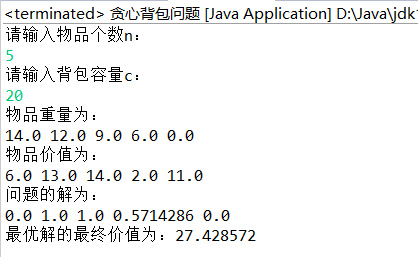Knapsack problem greedy algorithm
[problem description] n items and a backpack are given. The weight of item i is Wi, its value is Vi, and the capacity of backpack is c. How to choose the items in the backpack to maximize the total value of the items in the backpack
[problem analysis]
·General knapsack problem!
Optimal idea: considering the comprehensive effect of value growth and capacity consumption, i.e. each time I choose the item with the largest value to weight ratio vi/wi, i.e. first load it into the backpack, which is the final greedy strategy.
Manually input knapsack capacity c and item number n, the value of weight array w[i] of random biological product I and the value array v[i] of item I.
Program source code:
package SF;
import java.util.Scanner;
public class Greedy knapsack problem {
public static void main(String[] args) {
Scanner reader = new Scanner(System.in);
System.out.println("Please enter the number of items n: ");
int n = reader.nextInt();
System.out.println("Please input the backpack capacity c: ");
float c = reader.nextFloat();
float[] w = new float[n+1]; //Weight of articles
float[] v = new float[n+1]; //Value of goods
for(int i=0;i<n;i++){//Random number less than 20 for weight of goods
w[i] = (float) Math.floor(Math.random()*20);
}
System.out.println("The weight of the item is:");
for(int j=0;j<n;j++){
System.out.print(w[j]+" ");
}
System.out.println("");
for(int i=0;i<n;i++){//Value of goods is within random number (20)
v[i] = (float) Math.floor(Math.random()*20);
}
System.out.println("The value of the item is:");
for(int j=0;j<n;j++){
System.out.print(v[j]+" ");
}
System.out.println("");
float[] x = new float[n+1]; //Solution to the problem
//Greedy knapsack problem p = new greedy knapsack problem ();
p.Sort(n, v, w);
float s = p.Knapsack(w, v, x, c, n);
System.out.println("The final value of the optimal solution is:"+s);
}
float Knapsack(float w[],float v[],float x[],float c,int n){
float total = 0;
int i;
Sort(n,v,w);
for(i=0;i<n;i++)
x[i] = 0;
i = 1;
while(w[i]<c){
x[i] = 1;
total = total + v[i];
c = c - w[i];
i++;
}
x[i] = c/w[i];
total = total + x[i]*v[i];
System.out.println("The solution of the problem is as follows:");
for(int j=0;j<n;j++){
System.out.print(x[j]+" ");
}
System.out.println("");
return total;
}
private void Sort(int n,float v[],float w[]) {//Sort from large to small
int i;
float j;
float k;
for(i =0;i<n;i++){
if( v[i+1]/w[i+1] > v[i]/w[i] ){
j = v[i];
k = w[i];
v[i] = v[i+1];
w[i] = w[i+1];
v[i+1] = j;
w[i+1] = k;
}
}
}
}
Running screenshot:
